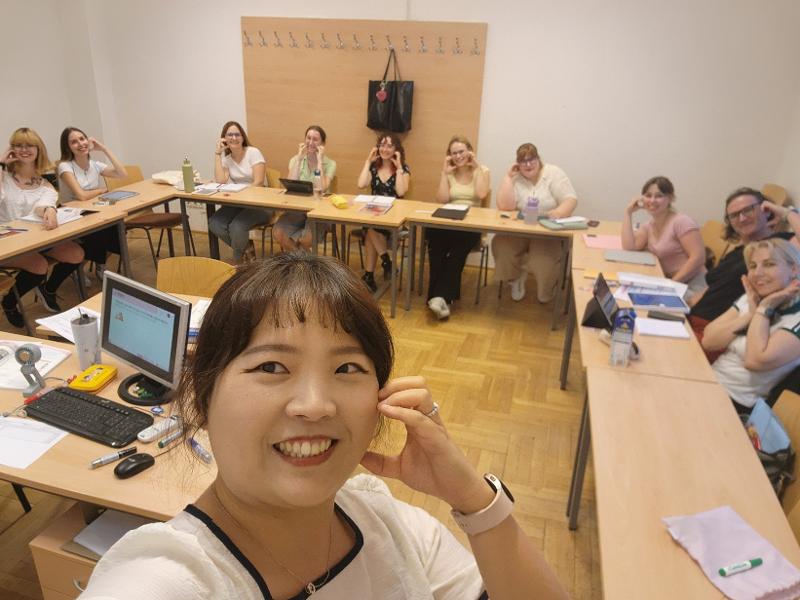
Teacher Park Insun poses for a group selfie with her students in a course on practical Korean at King Sejong Institute's branch in Budapest, Hungary, ahead of the institute's graduation ceremony for the second half of 2025. (Park Insun)
By Kim Seon Ah
Korean is no longer confined to the classroom as this year has students of the language connecting with the world through social media posts and intercultural exchanges.
Park Insun has experimented with these changes as a teacher deployed to the King Sejong Institute branch in Budapest, Hungary. She is the winner of the Minister of Culture, Sports and Tourism Award at this year's World Korean Educator Conference in Seoul.
She has created new teaching methods to empower her students not only as passive recipients but also "cultural bridges" that connect their cultures with that of Korea. The following is the full text of a Sept. 15 email interview with Korea.net.
- You won the Minister of Culture, Sports and Tourism Award as the top teacher at this year's World Korean Educator Conference. What lesson plan did you submit?
In this contest, I introduced a media writing class to create social media and the "Fighting! Pajti-ing!" program of language and cultural exchange between Korean students abroad and those at King Sejong Institute.
In my media writing class, students learned Korean expressions and writing styles used in social media such as neologisms and trending buzzwords, and they used them to make social media content introducing Hungary. Their content is shared on the Budapest institute's Instagram account Bualdan (@brd_sejong). This is useful data for Koreans who live in or plan to travel to Hungary.
In the "Fighting! Pajti-ing!" program, King Sejong Institute and Korean students in Budapest pair up to complete missions. While learning Korean, they also raise understanding of each other's culture and even plan Korean cultural events together. Students of Korean are more than just consumers who only receive the Korean language and culture; they develop into "cultural bridges" who introduce their cultures via the medium of Korean.
- What did you turn to digital-based learning such as creating social media content?
Students of Korean abroad rarely have opportunities to use the language they study in the classroom. That's why I sought to create a platform for them to use the language outside the classroom. Social media is a familiar space for such learners and the optimal open stage connecting students of Korean worldwide.
- When designing a lesson, what is the most crucial element: student level, interest or cultural background?
All three elements are important, but I prioritize student interest above the other two. This is because interest creates a student's own motivation to learn. I consider a student's level and cultural background as supporting factors that reinforce their interest at the next level.
- What do you consider the biggest barrier when learning a language? Do you have any unique approaches to help students overcome such obstacles?
There's a big gap between knowing and speaking Korean. In the classroom, students study and practice hard have few chances to actually use Korean. This is why they cannot use the expressions they learned in daily life. So I help students build small experiences of success. When they feel a sense of accomplishment that the Korean they learned works in real life, they seek more opportunities themselves. This naturally lowers the barrier in language learning.
- What about Korean has impressed you when teaching it to foreign students?
Korean has a lot of neologisms that are hard to translate exactly into Hungarian or English. Korean society apparently has a strong tendency to express emotions or situations in a more detailed and concrete manner. So neologisms come out constantly, and this also makes Korean a very nuanced language.
- What are the most rewarding aspects of being a teacher of Korean overseas?
I feel a huge sense of accomplishment when students say they learned so much after a semester; how they experienced Korean culture at cultural events and shared them afterward; and whenever they receive an award at Korean speech contests. It's not just about spreading knowledge that gives me pride, it's the feeling I get from being part of my students' journey of growth and achievement.
- How has your life or identity changed from teaching Korean in Hungary?
My belief in life has grown even stronger. I've always believed that people need dreams until they die, and this experience has further raised that belief. I've gained the strength to live not only as a teacher but as a dreamer.
- What message do you have for people wishing to learn Korean?
Learning Korean isn't easy but it's also a journey with big rewards and a sense of accomplishment. I suggest expressing yourself in Korean and experiencing a new world instead of feeling pressured to speak flawlessly. Mistakes are a natural part of the process. All of these experiences will further deepen and enrich your language skills.
You are a living bridge linking the world and Korea. I sincerely encourage you to become proactive participants in cultural exchange who build new ties and connect with the wider world through Korean.
sofiakim218@korea.kr